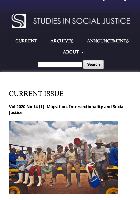
Studies in Social Justice
Scope & Guideline
Transforming dialogue into action.
Introduction
Aims and Scopes
- Critical Examination of Social Justice Issues:
The journal focuses on analyzing various dimensions of social justice, including race, gender, class, and disability, to understand the complexities and intersections that define contemporary social issues. - Interdisciplinary Approaches:
It encourages contributions from a wide range of disciplines, integrating methodologies from sociology, cultural studies, education, law, and the arts to explore social justice. - Community Engagement and Activism:
A core aim is to connect academic research with community activism, highlighting grassroots movements and voices of marginalized populations. - Innovative Methodologies:
The journal promotes the use of innovative research methodologies, including arts-based research, qualitative methods, and participatory approaches, to enrich the understanding of social justice. - Global and Local Perspectives:
It addresses social justice issues from both global and local perspectives, allowing for a nuanced understanding of how global injustices manifest in specific contexts.
Trending and Emerging
- Intersectionality and Social Justice:
There is an increasing focus on intersectionality, examining how various forms of oppression intersect and influence experiences of injustice, particularly regarding race, gender, and disability. - Digital Activism and Justice:
Recent publications highlight the role of digital platforms in social justice movements, exploring how technology can both empower and complicate activism. - Environmental Justice:
The theme of environmental justice is gaining traction, with research exploring the connections between environmental degradation, social inequality, and the rights of marginalized communities. - Mental Health and Social Justice:
There is a rising emphasis on mental health as a critical aspect of social justice, examining how systemic injustices impact mental health outcomes and access to care. - Global Migration and Justice:
The journal is increasingly addressing issues related to migration, focusing on the experiences of migrant workers, refugees, and the implications of global migration policies on social justice.
Declining or Waning
- Traditional Legal Frameworks:
There seems to be a diminishing focus on conventional legal analyses of social justice issues, with fewer papers discussing legal frameworks or policies compared to previous years. - Historical Narratives without Contemporary Relevance:
Papers that primarily focus on historical narratives without connecting them to contemporary social justice struggles are becoming less frequent, indicating a preference for research that bridges past injustices with current movements. - Disciplinary Isolation:
There is a noticeable decline in contributions that solely reflect a single discipline without interdisciplinary collaboration, suggesting a shift towards more integrated approaches. - Non-critical Perspectives on Activism:
Papers that adopt non-critical or overly celebratory perspectives on activism without engaging in deeper critiques of power dynamics and structural inequalities are becoming less common. - General Discussions of Social Justice:
Broad, unspecific discussions about social justice that lack depth or critical engagement are declining, with the journal favoring more targeted and nuanced analyses.
Similar Journals
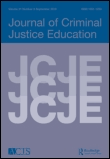
JOURNAL OF CRIMINAL JUSTICE EDUCATION
Transforming Education Through Insightful Criminal Justice ResearchJOURNAL OF CRIMINAL JUSTICE EDUCATION, published by Routledge Journals, Taylor & Francis Ltd, stands as a leading scholarly platform dedicated to the intersection of education and criminal justice. With a robust ISSN of 1051-1253 and an E-ISSN of 1745-9117, this journal provides a vital forum for the dissemination of research, critical analyses, and innovative pedagogical approaches in the field. Indexed in prestigious databases, it boasts impressive rankings—placing in Q3 in Education and Q2 in Law for 2023, with Scopus rankings of #272/1025 in Social Sciences Law and #825/1543 in Social Sciences Education. Addressing the critical needs of criminology professionals and educators, this journal seeks to bridge academic theory and practical application, thus enriching the field with its insightful contributions. While the journal does not offer open access options, researchers and practitioners are encouraged to engage with its comprehensive content to enhance their understanding and teaching within the realm of criminal justice education, fostering a more informed and effective legal system.
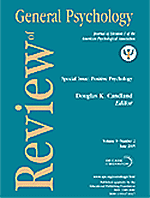
REVIEW OF GENERAL PSYCHOLOGY
Bridging Theory and Practice in PsychologyREVIEW OF GENERAL PSYCHOLOGY, published by SAGE PUBLICATIONS INC, is a leading journal in the field of psychology, specifically categorized in the Q1 quartile for Psychology (Miscellaneous) as of 2023. With an ISSN of 1089-2680 and an E-ISSN of 1939-1552, this esteemed journal provides a platform for innovative research and critical insights that shape the understanding of general psychology. Covering a wide array of psychological topics from theoretical frameworks to empirical investigations, the journal appeals to a diverse audience including established researchers, practitioners, and students aiming to stay abreast of current developments in the field. With a commendable Scopus ranking of #25 out of 216 in General Psychology, placing it in the 88th percentile, the REVIEW OF GENERAL PSYCHOLOGY plays a pivotal role in advancing psychological science. Its accessibility ensures that valuable research reaches a broad readership, enriching the dialogue within the discipline and fostering professional growth.

Onati Socio-Legal Series
Bridging the gap between legal frameworks and social realities.Onati Socio-Legal Series is a prominent interdisciplinary journal published by the ONATI International Institute of Sociology and Law, located in the culturally rich region of Gipuzkoa, Spain. With a commitment to open access publishing since 2011, it provides a valuable platform for researchers and practitioners in the fields of law and social sciences to share innovative scholarship, fostering a deeper understanding of the socio-legal dimensions that shape our world. Currently ranked in the Q3 quartile within both Law and Social Sciences categories, the journal serves a global readership and is indexed in Scopus, demonstrating its relevance and contribution to academic discourse. The period from 2019 to 2024 marks a pivotal phase in the journal’s evolution, aiming to address contemporary legal challenges through a socio-legal lens, making it an indispensable resource for scholars, students, and professionals alike.
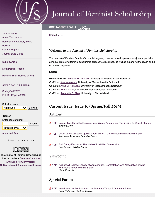
Journal of Feminist Scholarship
Challenging Norms, Celebrating Diversity.Welcome to the Journal of Feminist Scholarship, a distinguished academic platform dedicated to the exploration and advancement of feminist theories, gender studies, and social justice issues. Published by the University of Massachusetts Dartmouth, this open-access journal has been actively contributing to the field since 2011, ensuring accessibility to a diverse audience of researchers, scholars, and activists worldwide. With its commitment to interdisciplinary scholarship, the journal features peer-reviewed articles that challenge traditional narratives and highlight marginalized voices. Underpinned by a mission to foster critical discussions on gender, race, and identity, the Journal of Feminist Scholarship stands as a vital resource for those seeking to engage deeply with contemporary feminist discourse. Explore groundbreaking ideas and contribute to a more equitable academic landscape through this essential forum.
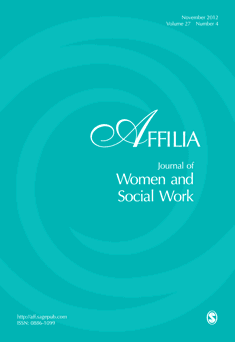
Affilia-Feminist Inquiry in Social Work
Challenging Norms, Inspiring Change.Affilia - Feminist Inquiry in Social Work, published by SAGE Publications Inc, stands as a critical scholarly platform dedicated to advancing feminist perspectives and social justice within the realm of social work. Since its inception in 1986, this prestigious journal has contributed significantly to the fields of Gender Studies, Social Sciences, and Social Work, consistently earning a Q1 ranking in these categories as of 2023. With a commendable Scopus ranking placing it among the top tiers of its field—ranked 28th in Gender Studies and 81st in the broader Social Sciences—the journal aims to foster an engaging discourse around the intersection of gender, social inequalities, and community practices. Although it does not operate under an Open Access model, its insights are invaluable to researchers, professionals, and students eager to explore and contribute to feminist scholarship and evidence-based practices in social work. As we approach its convergence period concluding in 2024, Affilia continues to challenge existing paradigms and empower voices within social work, making it an essential resource for those committed to progressive change.
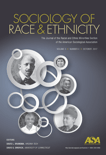
Sociology of Race and Ethnicity
Fostering understanding of diverse social landscapes.Sociology of Race and Ethnicity is a leading academic journal published by SAGE Publications Inc, dedicated to advancing the understanding of race and ethnicity within the realms of sociology and anthropology. Since its inception in 2015, the journal has rapidly established itself as a vital resource, achieving notable rankings as a Q1 journal in both Anthropology and Social Sciences, showcasing its impact within the academic community. With an impressive Scopus ranking of #23 out of 502 in Anthropology, it stands in the 95th percentile, and ranks #60 out of 604 in the field of Social Sciences, representing the 90th percentile. This commitment to high-quality research is reflective of its rigorous peer-review process and dedication to presenting innovative and impactful scholarship. Though not open-access, the journal ensures wide dissemination of pioneering research on critical issues related to race and ethnicity, making it an essential read for researchers, professionals, and students aiming to explore and understand the complexities of these pressing social dynamics. With its base in the United States and a forward-looking vision extending into 2024, Sociology of Race and Ethnicity is poised to remain at the forefront of sociological inquiry, shaping conversations and future research directions in this crucial field.

Qualitative Report
Unveiling Insights through Diverse MethodologiesThe Qualitative Report, published by NOVA Southeastern University, is a leading open-access journal dedicated to the rich field of qualitative research. Since its inception in 1990, the journal has emerged as an essential resource for researchers, practitioners, and students interested in cultural studies, education, and social psychology. With a notable impact factor reflected in its 2023 quartile rankings—Q1 in Cultural Studies, Q2 in Education, and Q3 in Social Psychology—the journal showcases cutting-edge research and diverse methodologies that advance understanding within these areas. Its Scopus rankings further underscore its influence, positioning it within the top 10th percentile in Cultural Studies and among the top tiers in Education and Social Psychology. The Qualitative Report is based in the United States and provides an innovative platform for disseminating impactful qualitative studies, reinforcing its commitment to fostering dialogue and promoting visibility in the academic community.
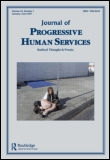
Journal of Progressive Human Services
Championing progressive methodologies for social change.The Journal of Progressive Human Services, published by Routledge Journals, Taylor & Francis Ltd, is a leading academic periodical dedicated to advancing knowledge and practice in the fields of social sciences, sociology, and political science. Founded in 1987 and currently running through to 2024, this esteemed journal is recognized for its significant contributions to understanding contemporary human services issues, emphasizing innovative methodologies and progressive approaches. With an impactful position as Q2 in multiple categories for 2023, its Scopus rankings reflect its robust scholarly influence, ranking #136/604 in Social Sciences (miscellaneous) and #364/1466 in Sociology and Political Science. While the journal is not Open Access, it offers valuable insights and research findings to academics, professionals, and students interested in social justice, community empowerment, and policy-making. The Journal of Progressive Human Services remains an essential resource for those committed to enhancing the welfare and well-being of all individuals in society.

JOURNAL OF FEMINIST FAMILY THERAPY
Empowering Families through Feminist InsightsJOURNAL OF FEMINIST FAMILY THERAPY, published by Routledge Journals, Taylor & Francis Ltd, is a pivotal resource in the realms of Applied Psychology and Gender Studies. With its esteemed standing, exemplified by its classification in both Q3 of Applied Psychology and Q2 of Gender Studies for 2023, this journal strives to explore the intersections of feminist theory and family therapy, paving the way for innovative practices and research methodologies. As a platform available from 1989 to 2024, it has consistently contributed to discussions surrounding gender, identity, and family dynamics within therapeutic contexts. Despite being a subscription-based journal, its impact in fostering critical thought and progressive approaches in the field is undeniable, making it an essential reference for researchers, practitioners, and students dedicated to understanding and improving familial relationships through a feminist lens. Notably, the journal ranks #96 out of 213 in Gender Studies and #199 out of 249 in Applied Psychology according to Scopus, highlighting its significance in scholarly discourse.
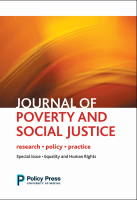
Journal of Poverty and Social Justice
Bridging theory and practice in social justice discourse.Journal of Poverty and Social Justice, published by Policy Press, stands as a pivotal resource in the fields of Public Administration and Sociology and Political Science. With an impressive impact factor positioning it in the Q2 quartile for both disciplines as of 2023, this journal engages the academic community in critical discussions surrounding poverty, social justice, and the intricacies of policy-making. Released quarterly from its inception in 2010 and set to continue through 2024, it provides a platform for innovative research, case studies, and theoretical reflections that seek to address the multifaceted challenges of poverty and promote equitable social policies. Although not an open-access journal, it offers essential insights for researchers, professionals, and students alike, making it an indispensable reference for those committed to advancing knowledge in social justice and welfare reform.